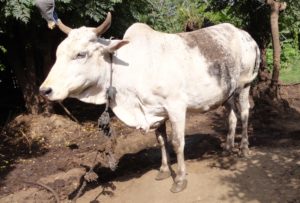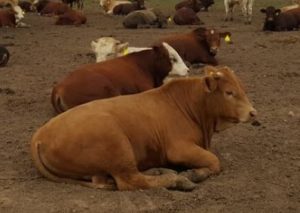Having worked in development for 25 years, I came to realize that can we can’t speak of food security and the need to link markets to the poor without making the sustainable actors of agribusinesses (large and small) the focus of our activities. Value-addition of drought-stricken livestock can prevent catastrophic losses of pastoral livestock during droughts.
Helping pastoralists make money from their drought-stricken livestock
NGOs and development partners can be, should be – and are critical players in establishing connections between the poor and agribusiness and, through innovative funding can actually show how value addition to products such as pastoral livestock can actually make money in global markets for these export businesses and the pastoralist livestock producers.
Quality feed and professional management can turn emaciated, drought-stricken livestock into market-ready animals in as little as 2-3 months
Here in Kenya and the surrounding Horn of Africa, we have recurrent droughts during which pastoral herders lose 30 – 70 % of their livestock. And by and large, these pastoralists remain unconnected to the global market, so the mortalities continue despite all decades of development assistance, government and NGO programs.
Livestock, even drought-stricken ones, recover quickly with proper care and feed.
Can NGOs & Development Partners Jump-Start the Process?
Can development partners and NGOs facilitate this linkage between poor pastoral livestock producers and sustainable export traders and agribusiness?
I believe they can set the stage for the private sector to get involved.
If development partners and NGOs fund initial demonstration in partnership with the private sector to demonstrate the benefits of value addition of pastoral drought-stricken livestock, bringing them to market weight so they can be viable products, rather than the dead animal pictures we’ve seen all too often in the Press.
Private-Sector Cash for Drought -Stricken Livestock
This would place cash in the hands of pastoralists during droughts—when they need it most and ensure a sustainable supply of livestock for exporters during periods of drought or even during extended dry spells.
This would be business. It would benefit all sides. And most importantly, it would be sustainable and begin linking pastoralists to global markets for the long-term.
What’s the evidence that this actually works?
The Feinstein International Center based at the Friedman School of Nutrition Science and Policy at Tufts University and others have evaluated this concept in Ethiopia. The evidence to date is, that this approach works producing between 6 – 41 times benefits over costs! Thus once the infrastructure is present these are win-win situations for all! Here are some links to their reports, articles and policy briefs.
Policy Brief: Benefits and Costs of Supplemental Cattle feeding During Droughts http://bit.ly/2edvbnh
Impact Assessments of Livelihoods-based Drought Interventions in Moyale and Dire Woredas http://bit.ly/2eIuqUa
Journal of Humanitarian Assistance: Money to burn? Comparing the Costs and Benefits of Drought Responses in Pastoral Areas of Ethiopia. https://sites.tufts.edu/jha/archives/1548
Could development partners and NGOs be the facilitators who by funding initial fattening and finishing activities of drought stricken-livestock, link agribusiness with marginalized pastoralists paving the way for lasting, sustainable, economic development?


